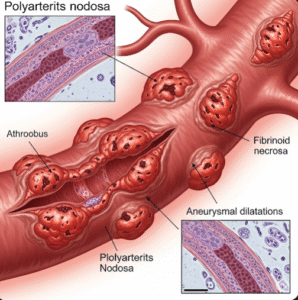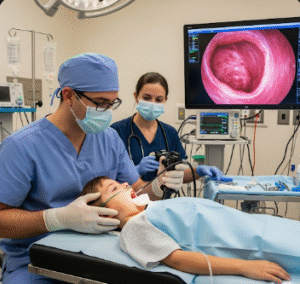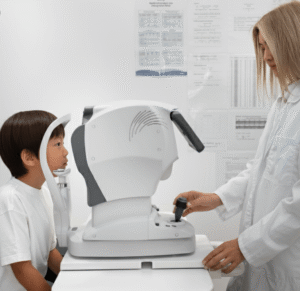Overview
Eye cancer refers to malignant tumors that develop in or around the eye. While relatively rare, it can affect vision, eye function, and in advanced cases, spread to other parts of the body. Early detection and treatment are critical to preserve vision and improve survival. South Korea provides advanced ophthalmology and oncology services for diagnosing and managing eye cancers.
What is Eye Cancer?
Eye cancer can develop in different parts of the eye:
- Intraocular cancers: Tumors inside the eye, such as uveal melanoma (most common in adults) and retinoblastoma (common in children).
- Orbital cancers: Tumors in the tissues surrounding the eye, including muscles, nerves, and fat.
- Eyelid cancers: Malignant growths affecting the eyelids, often basal cell carcinoma.
These cancers may affect vision, eye movement, or cause visible changes to the eye or eyelid.
Symptoms
- Visible growths or lumps on or around the eye
- Change in eye color (especially in the iris)
- Blurred or double vision
- Eye pain or discomfort
- Bulging of the eye (proptosis)
- Redness or swelling
- Sudden vision loss or dark spots in vision
Causes
- Genetic mutations in eye cells
- Family history of eye cancers (e.g., retinoblastoma)
- UV exposure, particularly for eyelid and conjunctival cancers
- Pre-existing eye conditions or nevi (moles) in the eye
- Weakened immune system
Risk Factors
- Age (retinoblastoma in children, uveal melanoma in adults)
- Fair skin and light-colored eyes
- Family history of eye cancer
- High sun exposure without eye protection
- Certain inherited genetic syndromes
Complications
- Vision loss in the affected eye
- Spread (metastasis) to other organs
- Cosmetic deformity due to tumor growth
- Recurrence after treatment
- Emotional and psychological impact
Prevention
- Regular eye examinations, especially in children and high-risk adults
- Protect eyes from UV exposure with sunglasses and hats
- Awareness of changes in vision or eye appearance
- Genetic counseling for families with inherited eye cancer syndromes
Treatment Options in Korea
South Korea offers comprehensive care for eye cancer, combining ophthalmology, oncology, and advanced imaging:
- Diagnosis
- Ophthalmologic examination using slit-lamp and fundoscopy
- Imaging: Ultrasound, MRI, or CT scan to determine tumor size and location
- Biopsy for histopathological confirmation
- Medical Treatment
- Chemotherapy for certain eye cancers, particularly in children (retinoblastoma)
- Targeted therapy for tumors with specific genetic mutations
- Radiation Therapy
- Brachytherapy: Radioactive plaque placed near the tumor
- External beam radiation for specific tumor types
- Surgical Intervention
- Enucleation: Removal of the eye in advanced or aggressive tumors
- Exenteration: Removal of the eye and surrounding tissues in severe cases
- Local excision or tumor resection for smaller tumors
- Follow-Up and Rehabilitation
- Regular imaging to monitor for recurrence
- Vision rehabilitation or prosthetic eye fitting if enucleation is performed
- Supportive counseling for psychological and cosmetic adjustment













